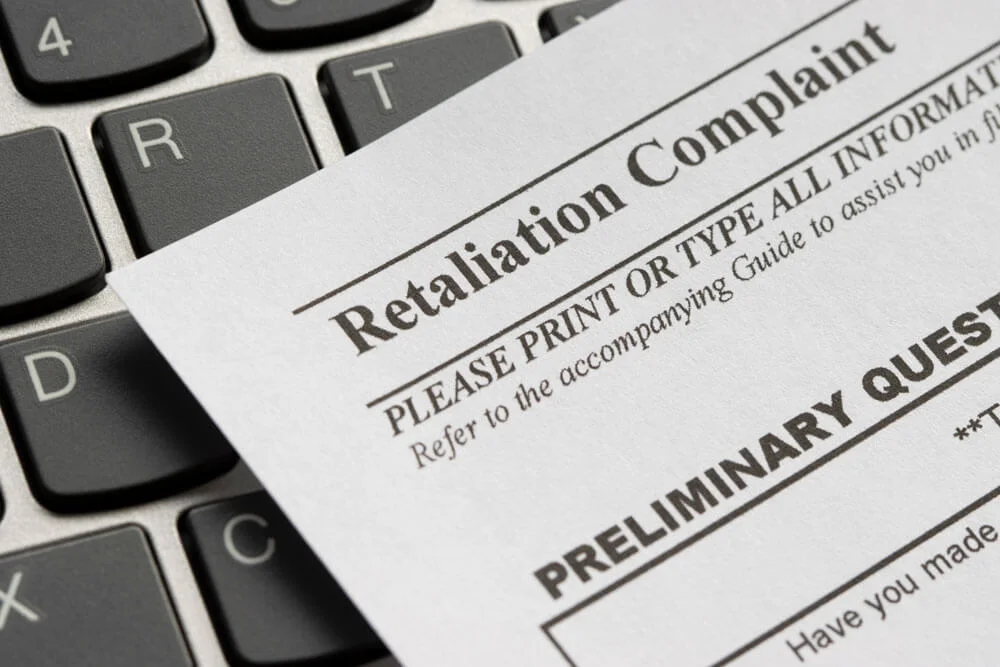Retaliation is an action an employer takes against an employee to punish him or her for engaging in a legally protected activity. Retaliation is also illegal. It is the most common charge filed with the Equal Employment Opportunity Commission (EEOC).
Determining whether retaliation has occurred is sometimes difficult but with the right documentation a claim of retaliation can be upheld in court as long as the facts of the case support it. You can take steps to improve the chance that the charge will stick if you have been an employee who has otherwise received positive reviews and has committed no wrong-doing.
THE DETAILS OF RETALIATION
There are two types of retaliation. Retaliation to opposition occurs when an employer requires an employee to perform any act made illegal by law. Retaliation to participation occurs when an employer takes a materially adverse action against an employee for:
- Filing a charge of discrimination with the EEOC or similar agency
- Participating or assisting in an agency investigation
- Filing or taking part in a discrimination lawsuit
In other words, the EEOC prohibits employers from punishing applicants or employees of any sort for asserting their rights to be free from employment discrimination. If you assert your rights in this area you are performing a protected activity.
Protected activities include:
- Refusing to follow orders that would result in discrimination
- Filing or witnessing an EEOC charge, complaint, investigation, or lawsuit
- Communicating with a supervisor or manager about employment discrimination
- Resisting sexual advances or intervening to protect others
- Talking about wages or compensation with a manager or co-workers, regardless of the involvement of a union or other formal organization
As long as the claim of harassment or discrimination is made in good faith, your employer is prohibited from retaliating.
However, it is not considered retaliation if your employer disciplines or terminates you or another employee for neglecting job duties, violate your employer’s rules, or other misconduct. If you have received poor performance evaluations due to improper behavior, disciplinary measures are typically not considered retaliatory.
If you make an EEOC complaint under these circumstances, the facts of the case will determine whether the employer has retaliated or not.
SIGNS OF RETALIATION
Sometime retaliation is pretty blatant. Other times it can be quite subtle. In all cases, retaliation is a “materially adverse” action that would deter a reasonable person from making a complaint. Materially adverse actions can include:
- Demotion
- Discipline
- Termination or firing
- Salary reductions
- Job or shift reassignments that cause hardship
- Unexpectedly negative performance review
- Sudden exclusion from staff meetings or training activities
Verbal or physical abuse as well as threatening an employee with making a report to authorities is prohibited, regardless of the employee’s immigration status. An employer may not even treat an employee’s family members negatively or spread false rumors.
PROVING RETALIATION
To prove retaliation you must show you were subjected to a negative or adverse job action because of a complaint you made of harassment or discrimination. The following three statements must all be true to prove your case:
- You engaged in a protected activity
- Your employer took action against you
- There is a causal link between your protected activity and the employer’s action
Gather as much evidence as possible to prove the link between your actions and the employer’s retaliation including emails and other documents showing your performance was acceptable prior to your complaint.
Obviously, most employers are not going to make your claim easy to prove; few come out and admit to retaliation or any other illegal action. Therefore, agencies and courts rely on the timing of the actions, and whether the employer had knowledge of your complaint or other protected activity.
WHAT TO DO IN CASE OF RETALIATION
Your first, best action is to consult with an employment lawyer. An attorney experienced in this area is of immense help in determining whether you have a case and the best method of protection.
An employment attorney will be able to tell you how strong your claim is and the type of records that are admissible in court. Your attorney will also ensure you meet all the applicable deadlines for filing charges with the EEOC.
It is expressly prohibited for an employer to retaliate against a full-time, part-time, seasonal, probationary, temporary, or former employee as well as against applicants who are engaging in a protected activity. Understanding the signs of retaliation and documenting your job performance and any abuse can help you prove your case.
Agencies involved in enforcing labor laws and protecting your rights include the EEOC, OSHA, and the Wage and Hour Division of the Department of Labor. You also have protection from your state and local agencies.

